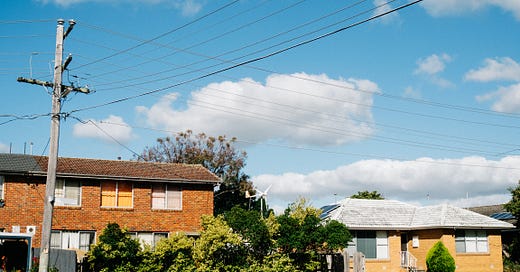Everything is political (including staff vs. student cricket)
The high school I went to had a tradition of holding staff vs student sports matches once per term. A different sport would be scheduled each term on a 2 year rotation. When the time rolled around, the staff and students would assemble their mixed gender A-teams and the rest of the students and staff would show up to cheer on their side. It went surprisingly well - the rivalry was always fierce but friendly, and in a way it really did level the field and bring everyone together. Except for one of those rotations - cricket.
Cricket needs 11 players per side, so the staff team could rarely recruit enough willing players, and unlike the netball, volleyball or the other staff student sports, you have to watch from really really really far away. And my tiny rural school certainly didn’t have any stadium seating alongside the cricket field for us to get a better view. So what was usually an energising and unifying occasion felt like a pretty solid flop every time cricket came around.
I found myself the head of the student council in my final year of school.. and so armed with the unmatched authority of being the leader of 14 nerdy students who wanted to attend lunchtime meetings about making the school better, my best friend and I decided that staff vs student cricket was the issue we wanted to take on.
We summoned the support of the student council and the teacher leading it, and carefully rehearsed our power speech with all the reasons we had for changing the cricket rotation to something else. (My memory is bad here - but I think we proposed a ‘Thank God You’re Here’ style stand-up comedy as an alternative - to be more inclusive to the non-sporty folks. Inclusion at its finest.)
We booked in a meeting with the principal and passionately articulated our case for killing cricket. The speech went well, our logic was sound, the changes we proposed were achievable and would benefit lots of people.
The only problem: That principal was obsessed with cricket.
He barely heard us out before informing us that cricket was ‘tradition’ and that there was no way we could think about changing it.
The power of the ordinary
Somehow though, I didn’t leave that interaction feeling totally powerless. In fact, my memory of that experience is mostly positive. What we were doing felt important. We felt empowered just because we tried, and I felt like I was representing my values, and the interests of people I cared about.
And it turns out dreams do come true, because a few years later… they ditched the cricket! My littlest brother never had to experience the suffering (sorry, cricket fans) that was staff vs. student cricket. Huge, I know.
However, if you’d asked me at that time what I thought about politics, I would have said “Oh, I’m not really into politics”.
IN THE MIDDLE OF MY CAMPAIGN AGAINST CRICKET.
(I mean… in some ways that was true that I wasn’t really into politics. I had to google the difference between Labor and the Libs a few months later when I turned 18 and went to vote, and I still think I accidentally voted for a party I didn’t intend to because I forgot which one was which colour on the black and white ballot paper, and also thought that I wasn’t allowed to google it again in the polling booth.)
While I have become much more informed about formal politics since that time, I’ve also come to realise the political power that exists in the mundane, ordinary parts of my life. And as a result, I now consider myself very much into politics.
The way I see it, politics is just the decisions we make about who we are as a collective - how we all figure out how function well together as the diverse hodge-podge of ordinary folks that we are.
And I do believe that the paths we choose to walk as individuals can shape the collective direction of society.
Well, most of the time I believe it. Honestly, I can be pretty cynical about that being true. We live in a system that relies on infinite growth, encourages individualism, and measures profit without considering the impact on people’s lives. A lot of the time, I feel trapped in the values of the systems that exist all around me, and skeptical that anything I could do to live more in line with my values could ever really make a difference to the world I live in.
So why Practical Politics?
At least for now, I’m going to choose to listen to the dash of inexplicable optimism that remains in me - the little voice that tells me that it is worth trying to navigate the world in a way that creates life, connection and hope, and that maybe, juuust maybe, others could benefit from me trying to do that too.
I’m hopeful that documenting some of my thoughts about shaping the world I live in in ordinary ways will help me stay connected to that sliver of optimism. I’m hopeful that I’ll find others who have asked some of the same questions I have about how to live a purposeful and values-led - though ordinary - life.
And perhaps most optimistically, I hope that you might be able to find some sparks of inspiration about how you, too, can become an artist on the canvas of your ordinary life.
And maybe one day, you’ll even say you’re into politics. Who knows?



